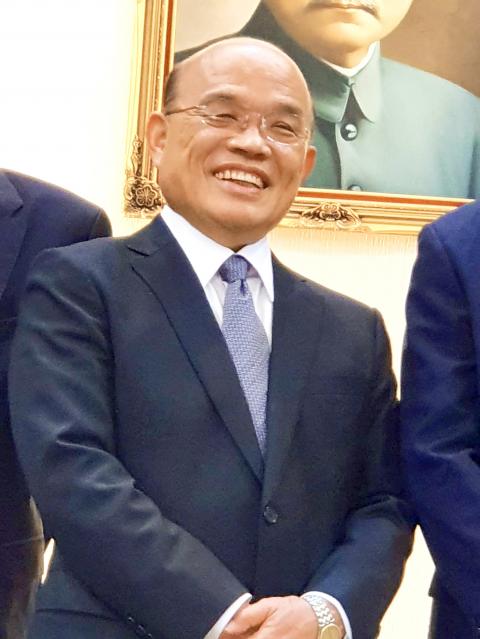Premier Su Tseng-chang (蘇貞昌) yesterday approved three plans proposed by the Ministry of Economic Affairs aimed at attracting an estimated NT$1.175 trillion (US$37.7 billion) of investment and 104,000 job opportunities over three years.
To encourage overseas Taiwanese to invest in Taiwan the government implemented the Action Plan for Welcoming Overseas Taiwanese Businesses to Return to Invest in Taiwan, which was funded by the National Development Fund.
However, due to the popularity of the scheme, the NT$20 billion allocated to the action plan has already been exhausted.

Photo: Li Hsin-fang, Taipei Times
As a result, a second edition of the plan, or Action Plan for Welcoming Overseas Taiwanese Businesses to Return to Invest in Taiwan 2.0, one of the three plans approved, was drafted.
The new plan promises an additional NT$500 billion in subsidies to overseas businesses returning to invest in Taiwan.
Under the new plan, the government is to subsidize 0.5 percent of the processing fees for businesses borrowing less than NT$2 billion, 0.3 percent for businesses borrowing NT$2 billion to NT$10 billion, and 0.1 percent for businesses borrowing more than NT$10 billion.
The loans must be repaid in five years, down from 10 years under the original plan.
The subsidies are to become available after the regulations have been confirmed, Deputy Minister of Economic Affairs Wang Mei-hua (王美花) said.
Meanwhile, the other two plans approved seek to extend the benefits to large businesses that have remained in Taiwan, as well as small and medium-sized enterprises.
Subsidies for the former group would be given according to the same rules that apply to overseas businesses returning to invest in Taiwan, while the latter would get a 1.5 percent subsidy.
The two groups are to be offered NT$80 billion and NT$20 billion in subsidies respectively.
The two plans are to take effect on July 1, Wang said.
The three plans would benefit not only businesses returning from abroad to invest in Taiwan, but also large enterprises that have never invested in China and small and medium-sized enterprises, Su said at a Cabinet meeting.
In addition to the subsidies, all three plans also have dedicated points of contact to help businesses secure land, water and electricity, and handle taxes, he said.
The government wants to show the corporate world and the public that it is determined to boost the economy, Su said.
It wants to demonstrate its effectiveness in reviewing applications, its flexibility in implementing plans and that it can “keep up with trends” and make adjustments as needed, he said.
The Cabinet on May 31 raised the foreign worker quota from 10 percent to 15 percent for multiple businesses, including Accton Technology Corp (智邦科技), the first company to be approved under the original action plan.
Additional reporting by CNA

Intelligence agents have recorded 510,000 instances of “controversial information” being spread online by the Chinese Communist Party (CCP) so far this year, the National Security Bureau (NSB) said in a report yesterday, as it warned of artificial intelligence (AI) being employed to generate destabilizing misinformation. The bureau submitted a written report to the Legislative Yuan in preparation for National Security Bureau Director-General Tsai Ming-yen’s (蔡明彥) appearance before the Foreign Affairs and National Defense Committee today. The CCP has been using cognitive warfare to divide Taiwanese society by commenting on controversial issues such as Taiwan Semiconductor Manufacturing Co’s (TSMC, 台積電) investments in the

INVESTIGATION: The case is the latest instance of a DPP figure being implicated in an espionage network accused of allegedly leaking information to Chinese intelligence Democratic Progressive Party (DPP) member Ho Jen-chieh (何仁傑) was detained and held incommunicado yesterday on suspicion of spying for China during his tenure as assistant to then-minister of foreign affairs Joseph Wu (吳釗燮). The Taipei District Prosecutors’ Office said Ho was implicated during its investigation into alleged spying activities by former Presidential Office consultant Wu Shang-yu (吳尚雨). Prosecutors said there is reason to believe Ho breached the National Security Act (國家安全法) by leaking classified Ministry of Foreign Affairs information to Chinese intelligence. Following interrogation, prosecutors petitioned the Taipei District Court to detain Ho, citing concerns over potential collusion or tampering of evidence. The

‘COMPREHENSIVE PLAN’: Lin Chia-lung said that the government was ready to talk about a variety of issues, including investment in and purchases from the US The National Stabilization Fund (NSF) yesterday announced that it would step in to staunch stock market losses for the ninth time in the nation’s history. An NSF board meeting, originally scheduled for Monday next week, was moved to yesterday after stocks plummeted in the wake of US President Donald Trump’s announcement of 32 percent tariffs on Taiwan on Wednesday last week. Board members voted to support the stock market with the NT$500 billion (US$15.15 billion) fund, with injections of funds to begin as soon as today. The NSF in 2000 injected NT$120 billion to stabilize stocks, the most ever. The lowest amount it

NEGOTIATIONS: Taiwan has good relations with Washington and the outlook for the negotiations looks promising, Minister of Economic Affairs J.W. Kuo said Taiwan’s GDP growth this year is expected to decrease by 0.43 to 1.61 percentage points due to the effects of US tariffs, National Development Council (NDC) Minister Paul Liu (劉鏡清) said at a meeting of the legislature’s Economics Committee in Taipei yesterday, citing a preliminary estimate by a private research institution. Taiwan’s economy would be significantly affected by the 32 percent “reciprocal” tariffs slapped by the US, which took effect yesterday, Liu said, adding that GDP growth could fall below 3 percent and potentially even dip below 2 percent to 1.53 percent this year. The council has commissioned another institution